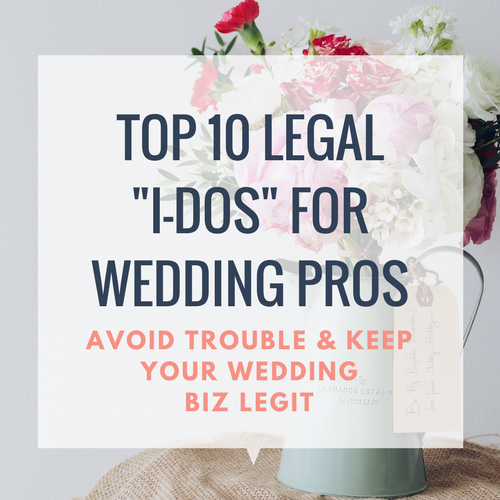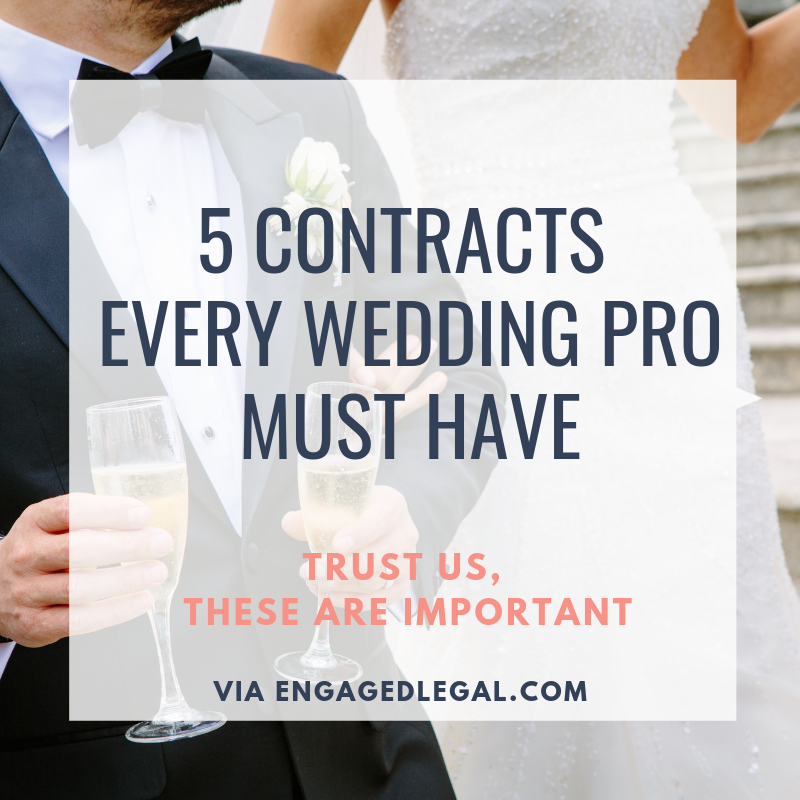How to Legally Open a Wedding Venue or Event Space
/You want to open a wedding venue? An Event Venue? That’s SO COOL! Can I move in?? Only kind of kidding…
Before you dive into making this wedding dream a reality, there’s some “legal considerations” we need to look at— yes, even before you buy the property!
Let's touch on some of the nitty-gritty steps of starting your wedding venue off on the right foot— from a legal perspective, of course!
1. Choose a Business Entity and Structure
The first step in starting any business is to choose a business entity and determine your structure.
The most common business structures are sole proprietorship, partnership, limited liability company (LLC), and corporation.
Each business structure has its own advantages and disadvantages, and the choice depends on the type of business you want to start, the number of owners, and the level of liability you're willing to take on.
I typically push wedding and event planners towards LLCs, because (i) they shield owners from personal liability, and (ii) they are simple to maintain. HOWEVER, an event venue may be more suited for a corporation, as you may have real estate investors. You will need to know this before you purchase the land so that the company can own the property.
You might also consider splitting the land and the service part of the company into two separate business entities to limit liability. This way, you’d have the real property (land/ building) in the name of one company, and it would be insulated from liability for the service part of the business.
2. Register Your Business with Government
Once you have chosen a business structure, the next step is to register your business. This involves registering your business name with:
your state government,
obtaining a federal tax identification number (EIN) from the Internal Revenue Service (IRS),
obtaining a state tax identification number,
registering for a business license with your locality, if required, and
obtaining any required licenses and permits (discussed more in detail below)
File your BOI with FinCEN (new requirement as of 2024!)
3. Zoning/ Land Use Permits
Wedding & event venues often operate in unique locations, such as historic buildings, rural estates, or scenic outdoor settings. As such, you'll need to verify that your chosen venue complies with local zoning regulations and obtain any necessary land use permits.
These regulations are designed to ensure orderly development, protect property values, and promote the health, safety, and welfare of communities. Zoning ordinances typically divide areas into different zones or districts, such as residential, commercial, industrial, and agricultural, each with its own set of permitted land uses and restrictions. These zoning laws dictate how properties can be used and may restrict certain activities, including hosting events. Ensuring that your venue or property is zoned appropriately for commercial events before you purchase the property is extremely important— otherwise, you may be stuck with a piece of land/ building that can’t be used to host events!
4. Apply for an Alcohol License
Champagne for everyone! 🍾
If you plan to serve alcohol at your wedding venue, you'll need to obtain the appropriate alcohol license or permit. This may include a liquor license from your state's alcohol regulatory agency (ABC is a big one) or a temporary permit for special events.
The process for obtaining an alcohol license can be complex and time-consuming, so it's advisable to start early and seek guidance from legal experts familiar with the regulations in your jurisdiction. There are “Alcohol Licensing Consultants” who can assist, or attorneys who specialize in this area.
5. Health and Safety Compliance
As an event venue owner, you have a responsibility to ensure the health and safety of guests. This includes compliance with building codes, fire regulations, and health department requirements, among other local and state ordinances. Depending on the size and scope of your venue, you may need to install safety features such as fire exits, emergency lighting, and restroom facilities that meet accessibility standards (as required by the Americans with Disabilities Act, or the “ADA”). Regular inspections may be required to maintain compliance with these regulations, depending on your state.
6. Choose/ Clear your business name
Before using a business name, it's important to check its availability not just on social media platforms, but in relation to trademarks. You can do this by conducting a trademark clearance search, which helps you determine whether the name is already registered as a trademark and/ or if it is available for use.
As a reminder, a trademark is a symbol, design, word, or phrase that is used to identify and distinguish services (or products) of one company from those of another. (note: Click HERE for an article about trademarks for wedding pros!)
A trademark clearance search is important because it helps you avoid potential legal issues and costly disputes with other businesses that have already established trademarks in the wedding and event industry. If you choose a business name that is too similar to an existing trademark, you may be sued for trademark infringement, which can result in legal fees, damages, loss of social media handles, and required rebrands.
You can conduct a quick trademark clearance search on the United States Patent and Trademark Office (USPTO) website or by hiring a trademark attorney to conduct a comprehensive search.
7. Obtain Adequare Insurance
Insurance is a critical aspect of operating a wedding and event venue, providing financial protection against various risks and liabilities that may arise during operations. While registering as a limited liability company or corporation limits an owners personal liability, it's also important to protect your business from liability by obtaining business insurance.
The best thing to do is ask fellow event vendors who they use, and consult with that insurance agent to determine appropriate coverage based on your own unique risks and needs. Some suggested insurance coverage includes:
General liability insurance
Property insurance
Liquor Liability Insurance
Event Cancellation Insurance
Professional Liability Insurance/ “Errors and Omissions” (E&O)
Cyber Liability
Workers Compensation Insurance
8. Open a Business Bank Account
Mixing personal and business finances, known as "commingling funds," can undermine the legal protections provided by limited liability entities. To safeguard your venue, it's crucial to establish clear boundaries between your personal and business finances.
The simplest way to achieve this separation is by maintaining a dedicated business bank account exclusively for venue-related transactions. All venue-related revenue should be deposited into this account, and personal withdrawals should be conducted through deliberate transfers to your personal account. This streamlines financial management by facilitating accurate tracking of income and expenses— and it makes tax reporting a lot simpler.
Additionally, implementing a system for recording income and expenses is essential. Maintain meticulous records, including receipts and invoices, and enlist the expertise of an accountant or bookkeeper to assist.
9. Put Proper Contracts in Place
Forgive me for stating the obvious, but Contracts are legally binding agreements between two or more parties that outline the terms and conditions of a business transaction. Contracts are critical for wedding venues and event venues because they:
Clarify Expectations: Contracts help memorialize the expectations of both parties. The contract should state the details of what is being provided by the venue, when it will be exchanged, where the services will take place, what services are provided, how much the client is going to pay, and what happens in a “worst case scenario.” By outlining the terms and conditions of the agreement, both parties have a clear understanding of what is expected of them and what they can expect from the other party.
Remember: clear is kind. Your clients probably looked at a few venues before selecting yours. Reiterate what is included and excluded from their service level— they will thank you later!
Resolve Disputes: Contracts provide legal protection for both parties if something goes off the rails. If there is a dispute, the contract can be used as a roadmap to resolve it— or even prevent it in the first place. A good contract provides a clear and enforceable framework for resolving disputes, addresses what happens after a breach of the agreement, and provides an “out” for the harmed party.
Distribute Risk: Contracts help manage risk for businesses— and this is especially important for a wedding venue or event venue where big dollars are on the line. By outlining the risks and responsibilities of each party, a contract can help mitigate the potential for unexpected costs or liabilities, and even shift the risk to the other party.
Crazy wedding guests punch a hole in the wall? Contracts can make sure the couple is responsible for paying for that damage.
Clauses like indemnification, liability limitation, and force majeure can protect venue owners when things get a little too wild.
Anddd….Shameless plug: Our Wedding Venue Contract Template has ALL of this good stuff in there to keep your liability minimized.
You may also need contracts between you and other vendors. For example, photographers own the copyrights in any photograph they take. so all wedding venues need to ensure they have a contract that permits their commercial use of those photographs on your websites and social media
***
It's important to note that the steps to legally open a wedding venue or event venue business vary depending on the state and locality, but this general outline should get you headed in the right direction— and make it easier to get moving forward confidently!
And a reminder…we’ve got a lot of contracts that accomplish all this and more to support you on this journey in our shop!



















